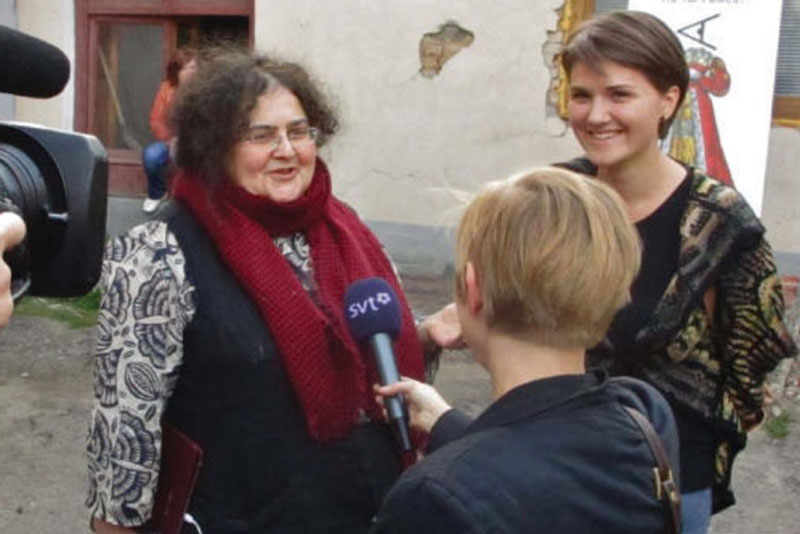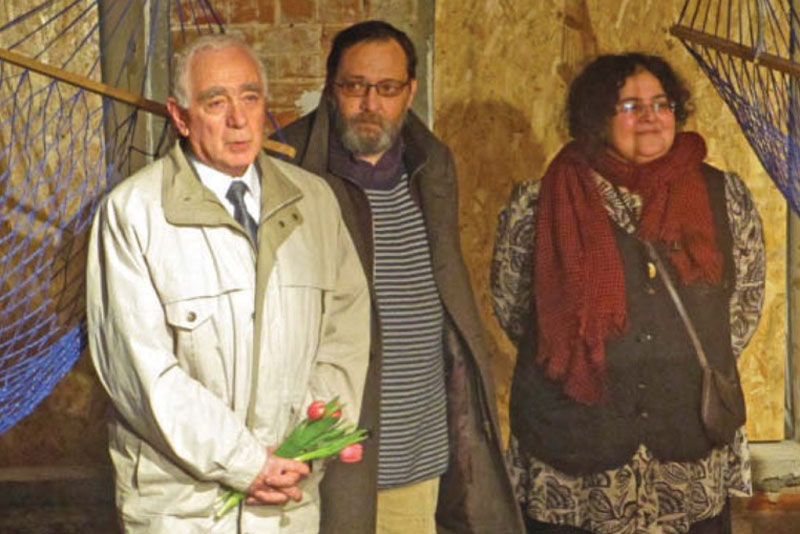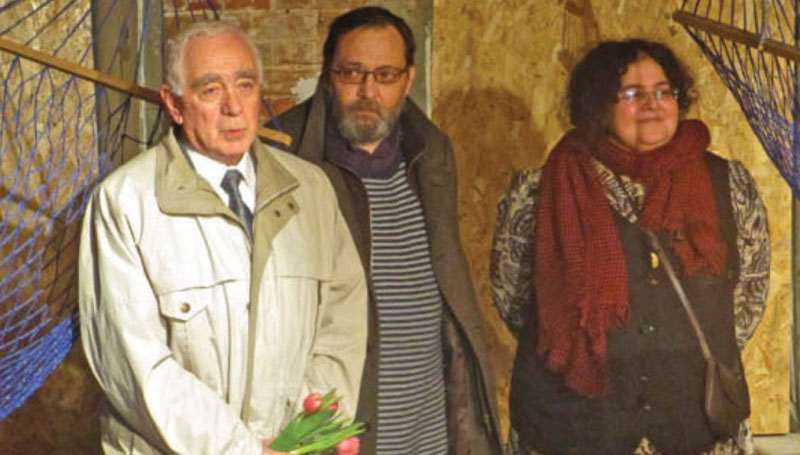Yelena Gremina: Letter from Marina Davydova of “Teatp”
The translated editorial that Marina Davydova offered Plays International & Europe (PIE) needs to be put in context. Firstly, let me remind you that Davydova is the editor-in-chief of the quarterly theatre magazine Teatr. which is published in Moscow. We have agreed to share our magazine articles, and PIE carried an editorial and an article from Teatr. for the first time in spring of 2019.
In this 2019 editorial Davydova grieves the loss of two people whose commitment to political theatre had bestowed upon many Russian playwrights, directors, and audience members, a sense of mission and solidarity. Yelena Gremina and her husband Mikhail Ugarov established the independent theatre Teatr.doc in 2002 and in doing so gave a theatre devoted to truth and humanism a chance to exist.
According to Sasha Dugdale, writing for the Guardian, Gremina was inspired to stage documentary theatre after having learned about this theatrical genre from British theatre practitioners visiting in Moscow. “Elyse Dodgson, the international director at the Royal Court discussed verbatim techniques in theatre – the use of oral testimony, edited to make a piece of theatre – it came as a revelation.” She and Ugarov founded Teatr.doc to stage documentary dramas that dared to transmit verbatim the full story behind politically sensitive events like protests and anti-government demonstrations.
They also staged documentary dramas that featured homeless people, single mothers in prison, and other people marginalized and outcast from Russian society. Gremina and Ugarov put characters on stage that spoke the genuine slurred and crude or idiomatic language of the streets; they and the playwrights who associated with them staged scenes where victims of government suppression and protesters were heroes. This outraged the Russian government. In direct response to Teatr.doc’s staging of The Bolotnya Case in 2015, its theatre building was condemned as unsafe, and Teatr.doc searched out a new building in which to stage its plays. Again they were forced to close down, and again they moved. And so it went, the cat and mouse game, until in April 2018 first Ugarov, and then less than two months later, Gremina, died leaving their followers feeling, as Davydova says in her editorial, “orphaned”.
Davydova’s editorial is a testimonial to the bravery, talent and humanity of these two people of the theatre. John Freedman, who supplied the photographs in this article exclusively to Plays International & Europe, wrote in the Moscow Times of May 17, 2018 that “the battle they thought was real and hard, and that together, they created Russia’s first-ever truly socio-political theatre, a theatre that had the nerve to stand tall and speak truth to power”.
This editorial from Teatr. was superbly translated by Julie Sorokurs, an assistant to the editor and critic-correspondent for “Plays International & Europe”.
Dana Rufolo
To Yelena Gremina: a letter to everywhere by Marina Davydova of Teatr.
Dear Yelena,
We put together this issue for everyone dear to Teatr.doc, but first and foremost, of course, for you. So shaken were we after the death of Misha (nickname of Mikhail) that we did this quickly, on the move, rearranging all of our editorial plans.
Many times already, I have imagined you taking our new issue into your hands, flipping through its pages, looking over the photographs and reading the texts; there are so many tender, wise, and important words about Mikhail Ugarov, it is as if they are trying to compensate for everything that was not fully given to him in life. Everything underappreciated. Everything not said.
When the issue was already in its final stages, I learned that you were no longer with us. You had followed Misha. That was a blow to the gut.
I was never a part of Teatr.doc’s inner circle, and I would never have the nerve to call myself your friend, but I joined everyone else in feeling suddenly orphaned. This feeling literally hovered over Moscow’s Temple of the Holy Trinity in Khokhly, where your services took place. One year of being an orphaned theatre – that is all we’ve had, in essence, to mark in 2019. Many words of high praise, poignant and mournful, have now been said in your and Misha’s honour: righteous, zealous servants, the Peter and Fevronia of the Russian stage. All very fitting words. But I want to add something else to them.
One could put together a most engaging long read, direct a feature-length film, or even write a book as part of the Lives of Remarkable People, [a popular and long-running series of biographies about prominent figures in history] all about you, the righteous, zealous servants of the stage, and about the amazing love you had for one another.
However, in order to devote an entire issue to profiling a single person (it seems as if no such precedent exists in the history of this magazine), further justification is needed. From the moment of the relaunch of Teatr. in 2010, we have suffered the loss of many outstanding artists, directors, and theatre-makers, but we never dedicated a separate issue to any of them but in this case, we decided to make an exception.
And that is no accident.
Ugarov was, after all, not just a dramaturge, a director, and a pedagogue. Having gathered everything that he said, thought, told his students, wrote on Facebook and cast away into the sidelines, I now understand that he was a true philosopher and theoretician of theatre. His musings, cast hither and thither, come together into a straight and holistic system when put under careful scrutiny. This system is not directly laid out in a work of its own (in this way, Ugarov was a kind of Socrates, whose philosophy was formulated in conversations with students and companions), but it exists! And at the end of the day, it decidedly changed the theatrical world for an entire generation of our dramaturges, directors, and artists.
“A true philosopher and theoretician of theatre.” Marina Davydova on Mikhail Ugarov.
In both depth and radicality, it could be placed alongside the most important theatrical systems, including the infamous system of the founder of the Moscow Art Theatre company. Yes, yes. I did not misspeak.

Yelena Gremina and playwright Polina Borodina. Photo credit: John Freedman.
The articles published in this issue make numerous mention of Roland Barthes, Guy Debord, and of course, the practitioners of London’s Royal Court Theatre whose conception of documentary theatre, once introduced to Russian parts, was taken to hitherto unobtainable heights by you Ugarov. But not once is Konstantin Stanislavski mentioned. And yet my mind most often went to him when I was studying the array of texts by and about Ugarov. Our hero shares with Stanislavski not only an absolute fanaticism in defending his ideas (no progress is possible without it, not in life, not in art), but also a passionate desire to reconsider the basic principles of theatre. Not to correct their every detail, but specifically to establish a new foundation for them. Aside from anything else, the Ugarovian standpoint is, essentially, an attempt at purging us of all our traditional assumptions about theatre in order to then pack the emptied space with new conventions.
“And what does the classical school teach? An event has taken place, and I, the actor, must respond to it. […] The psyche of a normal person does not allow for this, categorically. The law is completely different, the law of preservation: I do not react to this event, because if I react like this, without skin, only with nerves, I will not live to see the evening and we all understand that perfectly.
“Therefore, modern man is a very interesting creature: some monstrous event happens – zero reaction. That is, there is a reaction but it is elsewhere. “I will think about it tomorrow.” [Gone with the Wind]. This phrase is a classic postponed event. The heroine says: “I will not react now, otherwise the actress will get a dreadful mark in skill.
“The plays are written under this law. That is the difference. In the classical school, a lot is shown: I see, I hear, I react. In life, nothing is shown. And we with the actors of new drama have developed such a concept as ‘zero state’, in which the modern man stays the whole time”. In this way, Ugarov taught us about modernity through theatre and, in turn, through modernity he taught us about theatre.
“Here I am, an actor, playing Hamlet. I have no ethical obligations to this fellow. If I wanted to, I could play him as a homosexual, or with a limp. But when it is a real person, with whom I spent 20 hours in difficult conversation, I develop a sense of ethical obligation. I can no longer make a clown out of him, pull faces, ridicule him – I will seek a different method, change the approach to acting.”
In this way, similar to the very same Stanislavski, Ugarov combined aesthetics with ethics. And like Stanislavski, he made waging war on theatricality his primary objective in the theatre.
As such, the first principles of Ugarovian austerity are, at first glance, a bit strange: the artist needs neither scenery, nor make-up, nor anything else in the form of “support”. He needs only himself. He must find and extract everything from within himself. This preoccupation with the artist’s own identity also relates to the theatrical anthropology of Stanislavski.
Just as Stanislavski, Ugarov moved towards his theory through trial and error. Through practice. Through the personal experience of not finding much success as an actor. At the dawn of Teatr.doc, as if through a crystal ball, he saw its faint outline. Then it became clearer and clearer. At times, his energy of opposition took on a comic hue:
“What are you talking about – music, costumes? Have you lost your f–king mind, Denisova, you are in Teatr.doc!!’ – this he directed at Sasha Denisova during rehearsals for Light My Fire.
But from this energy of opposition, a new way of composing texts was born, a new way of engaging with them, a new way for an artist to exist on the stage, a new way of communicating with theatre-makers as a collective, new principles of pedagogy (not only in the theatre), and new conventions in the theatre would set for interacting with audiences.
“One needs to put on a play that gives the audience member a right to his own. What happens, then is a scene of grandiose proportions: three hundred people exit the theatre, which means that, with them, out come another three hundred plays”.

Ugarov and Gremina after performance of The Bolotnaya Case as father of an arrested protestor speaks. Photo credit: John Freedman.
Truth be told, I do not know who amongst today’s leading theatre-makers could simultaneously have such a direct and indiscernible influence on dozens of people, some of whom, after budding off from the theoretical output of Ugarov, would go on to do their own work. His standpoint resonated with the most diverse, and at times categorically dissimilar, phenomena – from the plays of Pavel Pryazhko to the theatrical experiments of Konstantin Bogomolov. I am not talking about borrowing, I am talking about the distant echo of his postulations.
I doubt that many outside “Doc” understood the immensity of the figure in front of them. They thought differently: “Yes, alright, this Melancholy Jacques is a gifted writer. And honest. And brave. But what does he have to do with theory and philosophy?” What does he have to do with it indeed? Ugarov compelled everyone around him with his new philosophy of theatre, including you, Lena.
He was the soul of Teatr.doc, and you its heart and driving force. Not only did you compose, create, and sparkle with ideas, but you carried him and managed him like an administrative-organizational mechanism. If it were not for you, I fear all of Misha’s ideas would have remained as some sort of empyrean art criticism. Because of you, his theory found a practical embodiment. It was almost a miracle. It is difficult for non-state theatre to survive anywhere, in Russia, with its rigid centralization of everything and anything, it is especially difficult, and in Moscow, with its exorbitant rent prices, it is almost impossible. Thanks to you, the theatre survived.
From the very moment of its emergence, it was met with lively opposition from the theatre world itself. This was no less traumatic than what was added to it soon after by the authorities’ active dissatisfaction.
“An old friend of mine, a critic my age, having stopped by Teatr.doc, says to me: ‘Well, alright. I’ve visited you, now I’ll go to the theatre’. ‘Which theatre, lyubochka (Ninochka)? I ask.’ ‘The Gogol Theatre’ she replies. I start laughing. ‘But why are you laughing?’ she replies. I start laughing. ‘But why are you laughing?’ She is alarmed.” This is an excerpt from Ugarov’s notes.
That was the theatre, perpetually existing in opposition – it did not matter whether the target was the political regime or the latest in theatrical art, so long as it was in opposition. Your sudden departure with Misha, is of course, the dreadful conclusion to a heroic life led in opposition. In this tragic accident, a tragically consistent pattern emerges.
And we are left with but one small comfort. Death is horrific. It should not exist. Sooner or later we will defeat it. However, death facilitates a distance from the departed that allows for an appreciation of their magnitude. I feel that every person who reads this issue of Teatr. magazine will be shaken by this magnitude.
And I hope that somewhere, far away, where all of our work lies, unembellished, you are together with Misha, and that you will also read it.
Translated by Julie Sorokurs.









